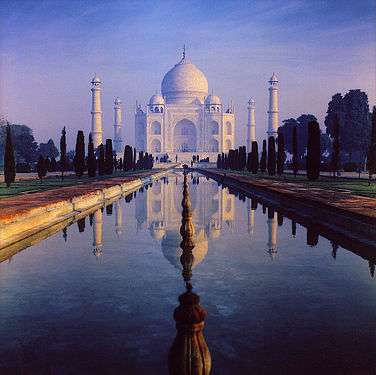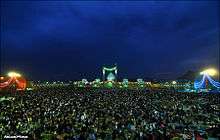Mid-Sha'ban
| Mid-Sha'ban | |
|---|---|
| Observed by | Muslims |
| Significance | Salvation |
| Date | 15 Sha'ban |
 |
| Part of a series on |
| Islamic culture |
|---|
| Architecture |
| Art |
| Dress |
| Holidays |
| Literature |
| Music |
| Theatre |
|
Bara'at Night (Arabic: ليلة البراءة, translit. Laylat al-Bara’at) or Mid-Sha'ban (Arabic: نصف شعبان, translit. Niṣf Sha‘bān) is a holiday observed by various Muslim communities on the night between 14 and 15 Sha'ban, that means the Full Moon day.[1] It is regarded as a night when the fortunes of men for the coming year are decided and when Allah may forgive sinners. In some regions, this is also a night when one's deceased ancestors are honoured.[2] Additionally, Twelver Shia Muslims commemorate the birthday of Muhammad al-Mahdi on this date. Some Salafi streams oppose the recognition of Mid-Sha'ban as exceptional.[3]
Etymology
The 15th of Sha'ban goes by several names, depending on the country in which it is observed. Most can be categorised into two general meanings:
- Mid-Sha'ban or Half of Sha'ban. Named after the day's chronological position in the eighth month of the Islamic calendar:
- Bara'at Night. Bara'at is an Arabic noun which is roughly translated to English as either innocence, records, assignment, deliverance or salvation.
Origins
The base for celebrating Mid-Sha'ban is not without dispute. Whether or not 15 Sha'ban is regarded as a special holiday, has primarily been an issue of interpreting the Quran and classifying the Hadith.
Quran
Although not mentioned directly in the Qur'an, two verses are sometimes ascribed to Mid-Sha‘ban:
"We sent it (this Qur'an) down on a blessed night. Verily, We are ever warning [mankind that Our Torment will reach those who disbelieve in Our Oneness of Lordship and in Our Oneness of worship]. Therein (that night) is decreed every matter of ordainments"[Quran 44:3–4]
This passage has however also been attributed to another Islamic holy night, Laylat al-Qadr, based on additional verses.[4][5][6]
Birthday of Muhammad al-Mahdi

According to Twelver Shias, Muhammad al-Mahdi, the final Shia Imām, was born on 15 Sha'ban. Shi'as celebrate Muhammad al-Mahdi's birthday on that day and perform religious acts such as prayers, fasting, and worship. Iranian cities are decorated on night of Mid-Sha'ban.[7][8]
Related customs
Mid-Sha'ban is celebrated in countries including India, Pakistan, Bangladesh, Sri Lanka, Lebanon, Iran, Azerbaijan, Turkey, Afghanistan, Uzbekistan, Tajikistan, Kazakhstan, Turkmenistan and Kirghistan. The Salafi Arabs do not celebrate this holiday. In the Arab world the festival is celebrated by Arabs with Sufi heritage, and Shias. In Iraq, children are given candies as they walk around their neighborhoods. Sunni Muslims in Iraqi Kurdistan and Afghanistan celebrate this holiday 15 days before Ramadan.[9] Some Muslims in Indonesia do communal zikr in mosques followed by a lecture (ceramah) led by an ustadz or otherwise known in Java and Madura as a kyai. This tradition is rarely followed in Indonesia, but it is widely followed in Aceh, West Sumatra and South Kalimantan. In South Asia, Muslims make sweets (especially Halwa or Zarda) to be given to the neighbors and the poor on the evening prior to the 15th of Sha'ban.[10] This custom of distributing Halva is also practiced in Bosnia on the 15th night of Sha'ban, as well as on three other holidays: Laylat al-Qadr, Laylat al-Mi'raj and Laylat al-Raghaib.
References
- ↑ Dinesh Bihari Trivedi; A. H. M. Zehadul Karim (1990). Law and order in upper India: a study of Oudh, 1856-1877. Northern Book Centre. ISBN 978-81-85119-83-0.
... The first significant religious occasion shabe-barat (lailat ul-barat or the night of deliverance) is held in the middle of Shaban (eighth month of the Islamic calendar) ...
- ↑ Jamal J. Elias (1999). Islam: Religions of the world. Psychology Press. ISBN 978-0-415-21165-9.
... Laylat al-bara'a ... fortune for the coming year is popularly believed to be registered in Heaven ... prayer vigils and by feasting and illumination ... oblations are made in the name of deceased ancestors ...
- ↑ Muhammad Umar Memon, Aḥmad ibn ʻAbd al-Ḥalīm Ibn Taymīyah, Ibn Taimīya's struggle against popular religion: with an annotated translation of his Kitāb iqtiḍāʾ aṣ-ṣirāṭ al-mustaquīm mukhālafat aṣḥāb al-jaḥīm, Mouton, 1976, ISBN 978-90-279-7591-1,
... among the Salaf as well as those among the khalaf, however, reject any excellence for the night in question and challenge the authenticity ... Marking mid-Sha'ban by fasting is without foundation, nay marking it is disapproved of. Likewise, celebrating it by preparing ...
- ↑ Quran 97:1–5
- ↑ Quran 2:185
- ↑ Fatwa by the Permanent Committee
- ↑ "Iranians celebrate birth of Imam Mahdi". Press TV. Retrieved 26 May 2015.
- ↑ "A Dazzling Night in Iran Embellished with Spirituality". Real Iran. Retrieved 26 May 2015.
- ↑ "Live Chennai: Shab-E-Barat - Festivals of India - Festivals in India - Muslim Festivals - Ramzan - Id-ul-fitr - Bakrid, Eid Mubarak". livechennai.com.
- ↑ "About: Shab-e-barat (شب برات)". Events In Karachi - Latest Event Updates- Articles - About Karachi.
External links
- Shabe-Baraat: Introduction and guidance on special prayers for the night. (Includes Salaatul Tasbih)
- Article on Shab-e-Barat
- Night of Salvation [Shab-e-Barat] and How to Spend it? http://seekerofthesacredknowledge.wordpress.com/2012/07/04/what-is-night-of-salvation-shab-e-barat-and-how-to-spend-it/